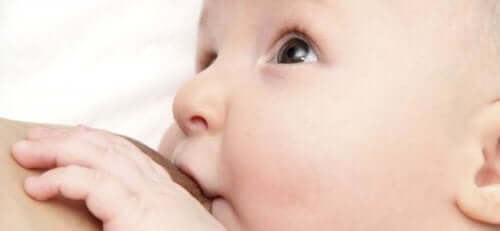Nutritional Supplements During Breastfeeding
Many women need to take nutritional supplements during breastfeeding, especially because during this stage, optimal nutrition is crucial.

Nutritional supplements accompany the pregnancy of many women. During this stage, optimal nutrition becomes necessary. However, during the postpartum period, there are many habits that we modify. In this sense, the question arises of when to stop taking supplements. Is it necessary to continue consuming nutritional supplements during breastfeeding?
Mothers who’ve decided to breastfeed sometimes wonder if regular feedings will contain all the nutrients their new baby needs. Vitamin deficiencies such as A and C are known to be common in the infant’s diet at times. Another typical case of deficiency is that of vitamin D, according to the following article published in the journal “PLoS One”.
It’s normal to have doubts about what to eat while breastfeeding and if it’s sometimes necessary to take nutritional supplements. During this period, there’s a greater demand for nutrients in the woman’s body. It’s a time that’s somewhat more intense than in the course of pregnancy.

Should we take nutritional supplements during breastfeeding?
The diet of the breastfeeding woman is very well defined, and generally, certain foods should be avoided and the consumption of others increased. As we know, the nutritional needs of mothers increase during the lactation period, which is why the beginning of strict diets isn’t recommended, especially those that involve reducing the consumption of calories below 1800 a day.
In cases where the mother drains her reserves in a relevant way, she may need to make a change in eating habits. On occasion, she may require supplements specially designed for this stage.
According to the experts’ explanation, the production of breast milk isn’t affected by the levels of protein, iron, carbohydrates, or calcium in the diet. That is, even when the mother doesn’t eat enough food that provides these nutrients, the quality of her milk doesn’t decrease considerably. However, it does affect the lack of water-soluble vitamins in the diet.
Among the vitamins that can be affected by an insufficient diet during breastfeeding are vitamins A, B, C, and D (fat-soluble), as these dissolve easily in the water used to produce breast milk. When there’s a deficiency in the replacement of these vitamins, the reserves are depleted each time the baby is fed. This situation can be detrimental to the mother.
However, vitamin D deficiency is endemic at the population level. For this reason, it’s advisable to monitor the intake of this substance in the mother to assess possible supplementation. More and more experts advise increasing the levels of this vitamin in the general population and in infants.
What supplements to take
Nutritionists say that despite the decrease in essential nutrients for producing breast milk, nutritional supplementation isn’t always indicated.
This action applies especially in cases of malnutrition or situations where the mother is intolerant to foods that provide the main nutrients; The incorporation of vitamin B12-based supplements is also recommended in women who follow any type of vegan diet, as its main source is found in foods of animal origin

The feeding of pregnant women, as well as breastfeeding mothers, is of interest to specialists, as it constitutes a very important element in the development of the baby and the mother’s health. Therefore, it’s a good idea for doctors to make specific recommendations on how the mother’s diet should be during lactation.
However, some specialists recommend that small doses of iron-based supplements and others of iodine be incorporated in scales of approximately 200 mcg daily. These minerals are beneficial for the newborn and also contribute to the recovery of the mother in the postpartum stage.
The recommendation for vitamin D supplementation has also increased greatly in recent years. In addition, a general multivitamin can be recommended, although in this situation, each case would have to be assessed in a particular way. If the diet is balanced, it’s not necessary to supplement water-soluble vitamins.
Other nutritional recommendations are based on the obligation to recover the energy lost during lactation, that is, an average of 70 kcal per 100 ml of milk. If we consider that during the day, a woman produces approximately 25 ounces of milk, to produce this amount she requires an energy consumption of at least 700 kcal.
Keep in mind!
Food’s an important factor in breastfeeding. Although the composition of milk won’t be greatly altered, a poor diet can cause harm to the mother.
For this reason, breastfeeding mothers should carry out a balanced and varied eating plan. In addition, supplementation with vitamin D and even iron or iodine can be positive. In the case of water-soluble vitamins, the increase in intake can be assessed if the recommendations aren’t reached through diet.

